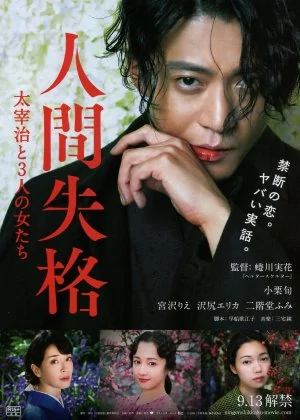No Longer Human
Movie details

Having just reviewed Mika Ninagawa's Diner, I was happily surprised to learn that her other 2019 feature project, No Longer Human [Ningen Shikkaku: Dazai Osamu to 3-nin no Onnatachi], wasn't too far behind. It's a very different film though and people expecting to see something similar to Diner should do best to read up on it first, but fans of Japanese drama (and Mika Ninagawa in particular) can rest assured. All her usual qualities are present and No Longer Human is another stylish and intruiging entry in Ninagawa's increasingly impressive oeuvre.
![screen capture of No Longer Human [Ningen Shikkaku: Dazai Osamu to 3-nin no Onnatachi]](/thumbs/img/articles/1200xauto/no-longer-human-1.webp)
I'm generally speaking not a big fan of biopics, because they are rarely very critical of their subjects (and that's putting it mildly). I'm just not a sucker for idolization. Japanese films about classic authors tend to be a bit different though. For some reason they prefer to zoom in on the quirkier, often juicier and darker sides of their protagonists. Think Rampo or Bitter Honey, and I guess we can now add No Longer Human to that list. Osamu Dazai may be held in high regard as an author, the film hardly paints him as a saint. Instead, it explores his infidelity and the different ways he uses the people around him to further his personal interests.
The idea of the tormented artist isn't all that original, but in these films the artists often end up being the tormentors. Dazai comes off as someone who lives a carefree life and doesn't really consider the consequences of his actions. He is more passionate about literature than he is about his friends and family, so whenever he can leverage his relationships for the sake of his art, he doesn't hold back. There's poetic beauty in that no doubt, and Ninagawa bares it with great skill, but it doesn't make the main character all that likeable, which is sure to alienate part of the audience.
The plot focuses on Dazai's debauchery, his bad physical condition and his unhealthy fascination with suicide (he made quite a few attempts himself, until he finally succeeded in '49). Even though Dazai is married and has a son, he still seeks out the companionship of other women. It brings him another son with a fan/aspiring writer, but it isn't until he meets Tomie that he is ready to leave his old life behind. He moves in with her and starts the final stretch of his short existence.
![screen capture of No Longer Human [Ningen Shikkaku: Dazai Osamu to 3-nin no Onnatachi]](/thumbs/img/articles/1200xauto/no-longer-human-2.webp)
Ninagawa's films are famed for their incredible colorful cinematography and once again she doesn't disappoint. It's not quite as extreme compared to her other films, but if you've familiar with Japanese historic dramas the effect here is still quite overpowering. Ninagawa's eye for composition and color is unmatched and the result is nothing less than stunning. This much visual blitz is sure to stir up some old style over substance debates, but rest assured that the film is more than just pretty pictures. Personally, I live for this kind of cinema, so it was reassuring to see that Ninagawa didn't just conform to genre standards here.
The soundtrack feels a bit more subdued, but again, compared to the usual piano/string music that tend to accompany these films it's in fact pretty outgoing and at times surprisingly leading. The music gives the film a slightly lighter and more contemporary vibe, though it still adds a lot of class too. It's not Ninagawa's most memorable score, especially not when seeing No Longer Human this close to Diner, though there are some standout tracks that do leave a lasting impression. It's well above average for a historic drama and an inspiration for directors working in this genre.
Ninagawa's films have never been shy of famous actors and No Longer Human is no exception. Dazai is played by Shun Oguri, who is successfully diversifying his oeuvre with both commercial and arthouse projects. The female trio of leads is even more impressive, with Rie Miyazawa, Erika Sawajiri and Fumi Nikaidô all putting in wonderful performances. Kengo Kôra and Tatsuya Fujiwara make notable appearances in secondary parts, rounding off a qualified cast that's at the top of their game.
![screen capture of No Longer Human [Ningen Shikkaku: Dazai Osamu to 3-nin no Onnatachi]](/thumbs/img/articles/1200xauto/no-longer-human-3.webp)
People who want a more comprehensive depiction of Osamu Dazai should probably look elsewhere. Ninagawa zooms in on a very particular period in the author's life, and while she explores various elements of his personality through the choices he makes and the actions he takes, it doesn't paint a very complete picture. I can't say it bothered me a lot, then again I'm not really familiar with Dazai, so expectations might be key here. And even though Ninagawa is quite critical of Dazai's character, it's nice to see that the result is still a layered character, with at least some of his original intrigue intact.
No Longer Human is somewhat new territory for Ninagawa. It's not that here earlier films were pure genre efforts, they've always had multiple layers in them, but the balance between drama and genre has tilted in favor of drama here. As a result, the film is stylistically slightly more subdued compared to Ninagawa's other work, but all her core qualities are still very much present and No Longer Human is all the more interesting for it. It's another worthy entry in Ninagawa's oeuvre, who is quickly establishing herself as one of the most talented directors working in Japan today.